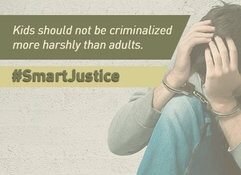Article Media

SAN DIEGO – The 4th District Court of Appeal, in a stunning rebuke to San Diego District Attorney Bonnie Dumanis, today ruled that Proposition 47’s sentencing reclassification provisions apply equally to children and adults.
San Diego District Attorney Bonnie Dumanis had sought to deprive juvenile offenders of the retroactive relief the initiative provides. Her office argued that juveniles are not eligible to have their past offenses reduced to misdemeanors, even though adults convicted of the same felonies may petition for such relief.
“Bonnie Dumanis, in her ongoing quest to mete out the harshest punishments to the most vulnerable San Diegans rather than pursue smart justice, disregarded the will of California voters and asked the Court to treat juveniles with misdemeanors as if they were felons,” said Margaret Dooley-Sammuli, director of the ACLU of California’s Criminal Justice and Drug Policy Project. “Had her unsupported reading of the law been upheld, it would have given prosecutors across the state the authority to do what many would consider unthinkable – criminalize children more harshly than adults.”
Proposition 47, a measure which passed with nearly 60% of the vote in November 2014, ended felony sentencing for six petty crimes, including simple drug possession and petty theft, and created a resentencing process for those certain felonies to be retroactively reclassified as misdemeanors.
The ACLU argued that denying juveniles the resentencing relief provided to adults with identical offenses, and denying these juveniles similar relief to that provided to juveniles charged after the initiative went into effect, violates juveniles’ equal protection rights under the California and U.S. Constitution.
“Today’s ruling makes the future a little brighter for many young people in San Diego. The Court recognized that juveniles have the same rights as adults under Proposition 47 and may petition to have eligible felony adjudications reclassified as misdemeanors. Such relief opens up doors in education, employment, and the military, and will assist those facing any future criminal or immigration proceedings,” said Chessie Thacher, an attorney at Keker & Van Nest. “Keker & Van Nest is very pleased to have been involved in this outcome and hopes the Court’s well-reasoned decision sets the stage for consideration of this issue across the state.”
It would be absurd for adults to enjoy rehabilitation as misdemeanants while children are punished with felony records and all the collateral consequences. “Doing so would not only run contrary to the rehabilitative purpose of the juvenile justice system, but would be an abdication of a district attorney’s responsibility to seek justice,” said Dooley-Sammuli. “And the Court has now confirmed it is unlawful, something that our district attorney should have known.”
After Proposition 47 passed and went into effect, a juvenile, Alejandro N., and 75 other children petitioned the court to ask that their offenses be reclassified as misdemeanors, thus minimizing the myriad negative consequences of a having a felony on their records. California and San Diego voters overwhelmingly approved the initiative that included the expressly retroactive resentencing and reclassification provisions in order to achieve the broadest relief possible for nonviolent, non-serious offenders.
The children’s cases were joined by the superior court after District Attorney Dumanis opposed them, arguing that Prop 47 should be read to treat child offenders more harshly than adults.
This is now the law of the state of California.
